|
October 6, 2011 - No. 9
40th Ontario General Election
What It Means to Think and Act in a New
Way
- Jane Steeple -
40th Ontario General Election
• What It Means to Think and Act in a New Way
- Jane Steeple
Voting Day
• Workers Must Prepare for Stepped-Up Attacks
on Public Sector Workers and Services - Pierre Chénier
• Workers and Their Allies Do Not Accept that
There Is No Alternative - Steve Rutchinski
• Deepening Crisis of Manufacturing
Migrant Workers
• The Fight of Migrant Workers for Their
Rights - Philip Fernandez
• The Necessity to Hold Government to Account
for Trampling Rights of Migrant Farm Workers - Jim Nugent
• Successful Caravan Focuses Attention on
Plight of Migrant Farm Workers
Letter to the Editor
• Reverse the Unjust Dismissal of Part-Time
College Workers! - Part-Time College Faculty Member
40th Ontario General Election
What It Means to Think and Act in a New Way
- Jane Steeple -
Workers have rights by virtue of being the producers of
all goods and services society needs for its existence yet their rights
are routinely denied, as they have no control over the economy of which
they are the decisive aspect. This lack of control over the part of the
socialized economy where they work and
the economy as a whole means that the human-centred outlook of the
working class and its rights are suppressed, as the economy both in its
parts and whole is dominated by the capital-centred outlook of the
owners of capital. The lack of control over the economy and denial of
the rights of the working class, which
is reflected in lack of control and denial of rights in politics and
the mass media, is a problem that workers are taking up for solution
and Ontario Political Forum seeks to give expression to their
voice.
 As in all aspects of modern
life, individual workers can only be effective in defence of their
rights at work and in the political and economic affairs of the
province if they organize consciously with other individual workers in
a human-centred way. Individual workers are virtually powerless against
the power
of monopoly capital and its capital-centred voice and control of the
political and economic affairs of the province. Individual workers
become effective and powerful in defence of their rights when united
consciously with other workers in every workplace, community,
educational institution, neighbourhood, seniors'
home and most importantly in their own working class political party. As in all aspects of modern
life, individual workers can only be effective in defence of their
rights at work and in the political and economic affairs of the
province if they organize consciously with other individual workers in
a human-centred way. Individual workers are virtually powerless against
the power
of monopoly capital and its capital-centred voice and control of the
political and economic affairs of the province. Individual workers
become effective and powerful in defence of their rights when united
consciously with other workers in every workplace, community,
educational institution, neighbourhood, seniors'
home and most importantly in their own working class political party.
Ontario Political Forum is convinced that the
voice of the working class will become the decisive factor in
determining a new direction for the political, economic, cultural and
social affairs of the province if only workers dare to do it. They have
a world to win!
Owners of monopoly capital and their capital-centred
voice are determined to block the voice of the working class from its
rightful place at the centre of the political, economic, cultural and
social affairs of the province. The task before the working class is to
break through the block imposed by monopoly capital
on the thinking, organization and voice of the working class, and bring
human-centred social consciousness and politics into the centre of
Ontario life.

Voting Day
Workers Must Prepare for Stepped-Up Attacks
on Public Sector Workers and Services
- Pierre Chénier -

It is striking that on voting day, the monopoly media
are setting a
tone of threats and dire warnings to the Ontario electors that
whichever Ontario government is elected tonight, it is going to have to
step-up its attacks against public sector workers and public services
under the hoax of deficit and debt reduction.
The ideological offensive that accompanies these
threats has many
themes. One of them is the assumption that public services and public
sector unions are largely responsible for Ontario's ballooning deficit
and debt. Another one suggests corruption on the part of governments
for caving in to "union
bosses" and "powerful public sector unions" in exchange for labour
peace and votes that are ruining Ontario's public finances.
 
OPSEU members
oppose public sector cuts,
Toronto June 17-18, 2011. (OPSEU)
|
The impression is given that public sector workers are
awash with
public money and are bankrupting Ontario. There is not a word in this
propaganda that proves any correlation between public sector workers'
wages and working conditions with Ontario's deficit and debt. Even the
data published by
the Ontario Ministry of Labour on settlements of collective agreements
show that the wage increases in the Ontario public sector have been of
1.5 per cent between January and July 2011, which is lower than the 1.9
per cent wage increases in the private sector. Increases of public
sector wages in 2010 were 1.9 per
cent and 2.5 per cent in 2009, well below average inflation for the
period and this after a decade (the 1990s) in which public sector real
wages decreased tremendously.
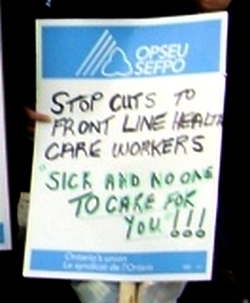 The situation is
particularly difficult for the tens of
thousands
of public sector workers who are working in increasing numbers for
agencies in health and education, such as long-term care and early
childhood education, where the wages are low and the benefits poor. To
demand that the wages and benefits
of these workers be frozen is an affront and will only compound the
economic crisis. It is also a convenient diversion from the real
plundering of the public treasury that is being caused by the
pay-the-rich economy in all its forms and by the fact that social
production in Ontario, especially manufacturing, is shrinking.
If workers are blocked from producing the wealth, where are the
resources going to come from to rebuild the public treasury? The situation is
particularly difficult for the tens of
thousands
of public sector workers who are working in increasing numbers for
agencies in health and education, such as long-term care and early
childhood education, where the wages are low and the benefits poor. To
demand that the wages and benefits
of these workers be frozen is an affront and will only compound the
economic crisis. It is also a convenient diversion from the real
plundering of the public treasury that is being caused by the
pay-the-rich economy in all its forms and by the fact that social
production in Ontario, especially manufacturing, is shrinking.
If workers are blocked from producing the wealth, where are the
resources going to come from to rebuild the public treasury?
Noisy propaganda is also made associating public sector
workers and
their working conditions with "union bosses" and "powerful public
sector unions." According to this correlation, improvements in wages
and working conditions are not really what workers want and need.
Unionized workers would
allegedly agree to participate in the collective effort to reduce
deficit and debt by slashing their wages and working conditions but
they are prevented from doing it by trade union leaders who keep
presenting irresponsible demands. The idea is presented that
governments get corrupted by agreeing to the demands of
the union bosses in exchange for labour peace and votes while union
leaders get more union dues and other favours that they can use for
political purposes.
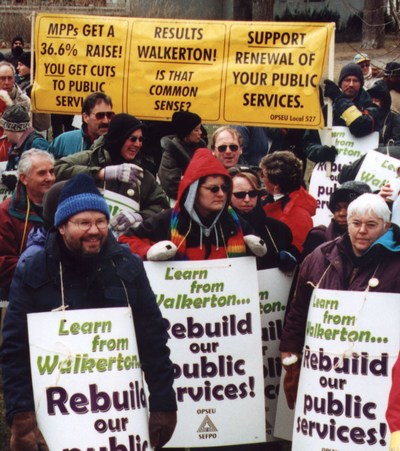
Public sector
workers highlight dire consequences of cuts to public sector, Toronto,
March 22, 2003.
|
The right of public sector workers to working
conditions that are
commensurate with the work they do, rather than being recognized and
provided with a guarantee, becomes a matter of "blackmailing"
governments to do things that are contrary to the public interest. The
conclusion is drawn that "ordinary
public sector unions" would be brought to toe the line of deficit and
debt reduction and agree to the lowering of their living standards if
their unions were crushed.
Also striking in this election is the silence over the
work of the
Commission on the Reform of Ontario's Public Services that was
established by the McGuinty government in its March 2011 budget. This
commission has been given a blank cheque to re-organize a major part of
the Ontario economy
that employs more than 1.1 million workers with hardly a word about it
mentioned during the election.
The March 2011 budget itself
included $200 million in
service cuts
and the elimination of 1,500 civil service jobs (in addition to the
3,400 job cuts in the 2009 budget) that were called "shorter term
initiatives." The Commission was mandated to look at the longer-term,
at advising the government on
fundamental reforms aiming at the elimination of the deficit.
The budget speech said, "Just because a government
department is
delivering a program or service today does not mean it should deliver
that program or service in the future." The Commission, it said, would
challenge "existing assumptions and traditional models." It also
announced the appointment
of former TD Bank Chief Economist and Senior Vice President Don
Drummond as Chair of the commission.
A report in the Globe and Mail the next day
expressed
glee about the opportunities "public sector reform" would open up for
the rich, especially the opportunities for big scores through
privatization:
"Ontario businesses got no new tax or spending goodies
in the
provincial budget tabled Tuesday, but the government opened the door to
possible privatization opportunities that companies could take
advantage of in the coming years. In a budget that promises to further
reduce the size of the province's
public service through thousands of job cuts, Ontario floated the idea
that many of its services could be delivered by private entities. The
provision of public services needs to be open to 'new forms of
competition,' the budget said. To figure out exactly how to rejig the
public service the McGuinty government
has hired Don Drummond."
The Globe and Mail was quite pleased with the
appointment
of Drummond to supervise slashing public services and privatizing
services. Drummond is one of those highly paid mercenaries who floats
back and forth between senior levels of government and senior
management of big monopolies
offering advice on and coordinating the neoliberal offensive. Before
going to TD Bank, Drummond was a Deputy to then Finance Minister Paul
Martin. At that time Martin was carrying out his "deficit reduction"
project by massive cuts to federal social programs and slashing tens of
thousands of jobs from the federal
civil service. More recently, Drummond's credentials include sitting
down with Toronto Board of Trade CEO Carol Wilding to help create Rob
Ford's election platform.
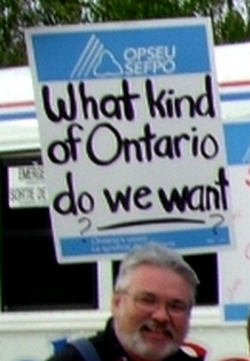 As Drummond so arrogantly
stated in a recent media
interview,
whether Hudak or McGuinty wins the election, the anti-worker scheme
demanded by the rich will be pushed forward by one of them: As Drummond so arrogantly
stated in a recent media
interview,
whether Hudak or McGuinty wins the election, the anti-worker scheme
demanded by the rich will be pushed forward by one of them:
"Somebody is going to have to do something, and it's
going to have
to be fairly forceful. Hopefully, it will be strategic and intelligent,
and it will minimize any kind of pain -- and there likely will be some
pain involved with it. On the day after the election somebody is going
to be knocking on the
Commission's door."
Clearly the table is being set for renewed attacks on
public sector
workers and public services under the hoax of deficit and debt
reduction. Workers must respond by stepping up their own work in
defence of workers' rights and to work out a pro-social solution to the
economic crisis of which government
deficits and debts are an integral part.

Workers and Their Allies Do Not Accept that
There Is No Alternative
- Steve Rutchinski -
 The Ontario electorate has
been put on notice that no matter who
they vote for, no matter what the outcome of the election, the next
Ontario government is going to have to cut more public services and
provide more "incentives" to attract "investment." The message was
delivered by David Dodge, former governor
of the Bank of Canada, in an interview published by the Globe and
Mail.
It initially appeared on September 6, one day before the election
officially began but has been taken up anew last week, on the eve of
the election, by the Globe and Mail, Windsor Star
and others. The Ontario electorate has
been put on notice that no matter who
they vote for, no matter what the outcome of the election, the next
Ontario government is going to have to cut more public services and
provide more "incentives" to attract "investment." The message was
delivered by David Dodge, former governor
of the Bank of Canada, in an interview published by the Globe and
Mail.
It initially appeared on September 6, one day before the election
officially began but has been taken up anew last week, on the eve of
the election, by the Globe and Mail, Windsor Star
and others.
David Dodge is described by the monopoly media as the
"sober voice
of economic reason." This is a man whose career of "public service"
includes overseeing the destruction of the former unemployment
insurance system, which he characterized as an incentive to not work;
championing the free-trade
agreement with the U.S.; and his "biggest accomplishment" being his
work in the 1990s with then Finance Minister Paul Martin of smashing
the federal provincial transfer arrangements for health, education,
public housing and other social programs across the country, in order
to "pay down the deficit." That money
has long disappeared while Canada remains saddled with a billowing
debt!
Dodge is also a former Chair, and current member, of
the Board of
Governors of the CD Howe institute, a "think-tank" for the rich, that
has such notables as former Ontario premier Mike Harris on its payroll,
advising government on "public policy" in service of the rich. You
decide whether David
Dodge is a "sober voice of economic reason."
One thing is certain -- he is a prizefighter for the
rich and their
anti-social offensive. Another is that twenty-five years and more has
amply proven that everything David Dodge has championed on behalf of
the rich and their system to have Canada and Ontario "open for
business" has failed miserably.
The proof is in the pudding: the recurring crisis and harder times yet
to come that Dodge says lie ahead.
With utter contempt for this truth and for democratic
principles,
the monopoly media have taken up the threats of David Dodge and the CD
Howe Institute that regardless of the election outcome, Ontario will
have to "tighten its belt." The Windsor Star wrote on
September 24: "The most
dismal thing about this election, apart from the dearth of talent, is
that nobody running for office has the guts to remind Ontario residents
that the glory days are long gone and we must face hard truths about
our future." The Globe and Mail followed up on September 25
saying according to Dodge: "The
new government will need to cut spending and that's not being
telegraphed very hard" by "Ontario's three political leaders."
The rich and their prize-fighters take no
responsibility that the
crisis is the crisis of their system. The capitalist economic system
and its obsolete relations of production are the root cause of this
crisis and all its ugly features, from the wrecking of manufacturing,  to growing unemployment, the
debt
and deficit crisis and the gathering storm clouds of another recession.
They see no alternative and have no solutions except more of the same
anti-social, neoliberal offensive, because they are self-serving in the
extreme. to growing unemployment, the
debt
and deficit crisis and the gathering storm clouds of another recession.
They see no alternative and have no solutions except more of the same
anti-social, neoliberal offensive, because they are self-serving in the
extreme.
There is an alternative. Another Ontario is possible.
However, the
working class and its allies will never be able to stop these crises
and bring an alternative into being until they seize the day and
organize themselves as an effective opposition and bring themselves to
power so they can set a new direction
for the economy and put the human factor/social consciousness smack in
the middle of all economic, social and political considerations, where
it rightly belongs.

Deepening Crisis of Manufacturing
In Welland, on September
30, after 80 years in the city, the Henniges Automotive Products Plant
closed the doors on its 300 remaining workers. United Steelworkers
Local 455 President Darren Cochrane said, "It's a dark day here, very
dark. I think the local did everything it possibly could to try and
stop this
from 2006 on. We have a bunch of greedy corporations who want to make
more money. The 12 per cent to 13 per cent return they were getting
here wasn't enough. They want 20 per cent and 30 per cent."
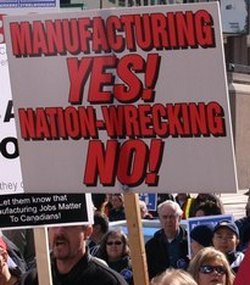 The workers had thrown a
"retirement party" at Club
Richelieu the previous Sunday which was attended by over 1,000 veterans
of the plant. The proceeds from the raffle draws went to Welland's HOPE
Centre food bank. Said one worker, "All we can do is speak our piece
and hope someone hears." Another asked that "politicians take their
heads out of their butts and do
something about this situation of the loss of manufacturing jobs." The workers had thrown a
"retirement party" at Club
Richelieu the previous Sunday which was attended by over 1,000 veterans
of the plant. The proceeds from the raffle draws went to Welland's HOPE
Centre food bank. Said one worker, "All we can do is speak our piece
and hope someone hears." Another asked that "politicians take their
heads out of their butts and do
something about this situation of the loss of manufacturing jobs."
Welland's Mayor Barry Sharpe complained that for many
years every time the city attracts new business another major
manufacturer closes. The only sizable plant left in the city is the old
Stelco-Stelpipe plant now operating as Lakeside Steel. He said he
believes the city can still pull together to get through these
"challenging times."
This is but one example of the deepening crisis of
manufacturing in Ontario. Official data usually refer to 2002-2003 as
the start of the massive loss of manufacturing jobs. The Ontario
Ministry of Finance released data when presenting its 2011 budget that
shed some light on the scope of the crisis, based on figures provided
by Statistics Canada, which gives figures on
manufacturing as a whole rather than on all the industries that make
the sector. Despite this, the figures reveal that manufacturing has
shrunk both in absolute terms and in its relationship with the total
employment in the province.
From 2000 to 2011, employment in Ontario's manufacturing
sector shrank by 271,000 jobs. From 2003 to 2011 it has shrunk by
289,000 jobs. Manufacturing employment started to shrink annually in
2004 with a huge drop of 12 per cent between 2008 and 2009, from
901,000 to 797,000. It reached a new low
in 2010 with 774,000 jobs left. Statistics Canada estimates that in
2011 the remaining manufacturing jobs in Ontario stood at 804,000.
Various experts have been quick to conclude that this
means manufacturing jobs are coming back but there is no indication
what these manufacturing jobs might be. It is not clear if these
are the same jobs that were
lost previously or other ones. All in all between 2000 and 2011,
Ontario has shed 26 per cent of its manufacturing
employment according to these figures.
Striking too is the steady shrinking of manufacturing in
relationship with Ontario's total employment. In 2000, manufacturing
represented 18.4 per cent of total employment in the province. In 2003,
it fell to 17.5 per cent. In 2007, 2008, 2009, 2010 and 2011,
manufacturing represented respectively 14.4 per cent,
13.5 per cent, 12.2 per cent, 11.6 per cent and 11.9 per cent of total
employment in Ontario. Recent data (August 2011) put manufacturing at
804,000 jobs, total goods producing industries at 1,417,000 jobs and
services producing industries at 5,327,000 jobs.
The Ministry of Finance data reveals that the output per
industry between 2003 and 2010 has been negative (this means shrinking
of production) in almost all the industries that make up the
manufacturing
sector: food processing, textile, wood and paper products, chemical and
petroleum products, plastic and rubber,
primary metal and metal products, machinery, electrical and
electronics, and auto (both vehicles and parts).
This is a serious problem and it is not going to be
solved by paying the rich in the form of tax cuts, public subsidies
-- including so-called rewards for job creation and more generally by
putting all the social assets at the disposal of the global monopolies
in the hope that there is going to be a "trickle down effect."
This has been done for a very long time and it has not sorted out the
problem.
Sorting out the crisis of manufacturing means that
manufacturing employment has to be defended and that manufacturing must
be rebuilt in a way that contributes to nation-building. We need an
economy that is pro-social and sovereign and engages in trade with
others on the basis of mutual benefit. Manufacturing
is an important part of nation-building. The starting point for the
workers is to refuse to be marginalized when it comes to
decision-making and setting the direction of the economy.

Migrant Workers
The Fight of Migrant Workers for Their Rights
- Philip Fernandez -
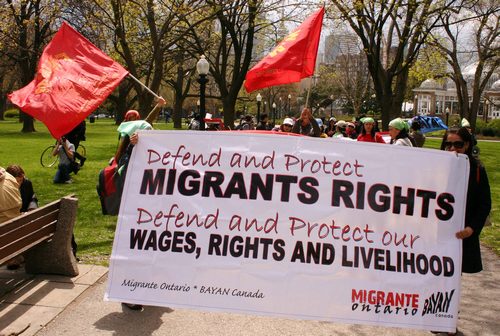 More than 280,000 migrant
workers are brought to Canada annually through a partnership between
private sector monopolies and the government of Canada. According to
the April 2011 issue of Focal, a newsletter prepared for the
Canadian International Development Agency: "Canada's temporary
foreign workforce has expanded significantly over the past 10 years. In
2010, 283,096 migrants of all skill levels were granted temporary work
visas in industries across Canada. In the agricultural sector, there
has been steady demand for migrant workers from Latin America and the
Caribbean (LAC), whose numbers
have tripled since 1999. Canada's Seasonal Agricultural Worker Program
(SAWP) was initiated in 1966 through an agreement with Jamaica and has
grown to include Mexico, Trinidad and Tobago, Barbados and the
Organization of the Eastern Caribbean States in response to employer
demand to sustain agricultural
production in Canada. It has grown from 264 workers in 1966 to 23,375
in 2010." More than 280,000 migrant
workers are brought to Canada annually through a partnership between
private sector monopolies and the government of Canada. According to
the April 2011 issue of Focal, a newsletter prepared for the
Canadian International Development Agency: "Canada's temporary
foreign workforce has expanded significantly over the past 10 years. In
2010, 283,096 migrants of all skill levels were granted temporary work
visas in industries across Canada. In the agricultural sector, there
has been steady demand for migrant workers from Latin America and the
Caribbean (LAC), whose numbers
have tripled since 1999. Canada's Seasonal Agricultural Worker Program
(SAWP) was initiated in 1966 through an agreement with Jamaica and has
grown to include Mexico, Trinidad and Tobago, Barbados and the
Organization of the Eastern Caribbean States in response to employer
demand to sustain agricultural
production in Canada. It has grown from 264 workers in 1966 to 23,375
in 2010."
Almost 100,000 migrant workers come to Ontario to work
in the agricultural sector, the building trades and in other sectors of
the Ontario economy. They are an integral part of the Ontario working
class and because of their precarious status, face the most brutal
exploitation and work in conditions of virtual
slavery. They are also used by the rich agricultural, building, tourism
and other monopolies to exert downward pressure on the living
and working conditions of all Ontario workers. Migrant workers face
extremely bad
working conditions; they are sometimes required to pay exorbitant
recruitment and work-placement fees and
the laws make it very difficult for them to organize to fight for their
dignity and their right to safe working conditions, benefits, proper
medical care and so on.
On April 29 the Supreme Court of Canada ruled
against migrant workers in Ontario when it overturned an Ontario court
ruling and upheld the constitutionality
of the Agricultural Employees Protection Act
(AEPA),
introduced in 2002 by the Eves Conservative government. The legislation
blocks the right of agricultural workers
to collective bargaining to achieve a modicum of dignity. The decision
of the Supreme Court in favour of the McGuinty government's
narrow interpretation of the law completely denies the alleged aim of
the law, which is to provide the rights of the workers with a
guarantee. Instead it reveals that the law is
to provide the interests of the super-exploiters of migrant labour with
a guarantee. So long as principles of fundamental justice are thrown
out the window what is the use of legislating laws and having courts?
They are supposed to uphold public right, not defend the rich and
powerful. The Mike Harris government
in 1995 amended the Labour Relations Act to exclude farm
workers from joining a union. That legislation was ruled
unconstitutional in 2001 by the Supreme Court of Canada. Nonetheless,
today Ontario governments continue negating the right of the farm
workers to have a say in the determination of
their working conditions. The Supreme Court decision was an attack on
the rights of all workers and a blow to the 20-year struggle by the
United Food and Commercial Workers' Union (UFCW) and other collectives
to achieve dignity and labour rights for the almost 80,000 domestic and
migrant farm workers in Ontario.
But their struggle continues because the unacceptable conditions
continue.
The defence of the rights and dignity of migrant workers
is an integral part of the fight of Ontario workers for the rights of
all workers and their collectives for working and living conditions
commensurate with the work they do.

The Necessity to Hold Government to Account for
Trampling Rights of Migrant Farm Workers
- Jim Nugent -
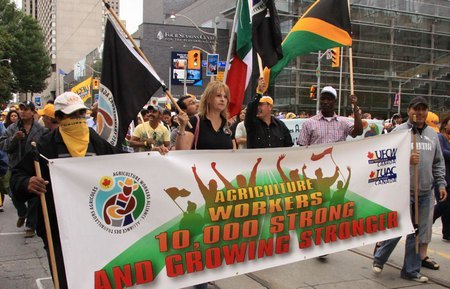 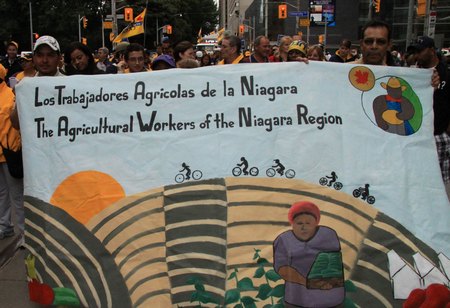 Migrant farm workers
participate in Labour Day 2011 in Toronto.
Migrant farm workers
participate in Labour Day 2011 in Toronto.
Migrant workers in Ontario's industrial farming system
are a section of the Canadian working class whose rights as workers and
as human beings have been brutally trampled by Ontario governments for
over 60 years under the Seasonal Agricultural Workers Program (SAWP).
Through arrangements between the governments of Ontario,
Canada and the sending countries, workers are brought from Mexico,
Jamaica and elsewhere to be exploited with impunity by large-scale
horticultural agri-business owners. These workers produce more than
half of the crops grown in Ontario's agricultural
sector every year but are denied all civil rights in a way very similar
to how slaves were excluded from civil society in the dark days of
chattel slavery.
Migrant farm workers fall under the jurisdiction of
provincial labour laws but Ontario governments have excluded them from
basic labour standards. Employers of migrant farm workers were even
exempt from health and safety regulations until 2006 when the migrant
farm workers fought it out with the Ontario
government in court to have farms included. In contempt of the court
ruling, Ontario continues to allow farm employers to violate health and
safety standards with impunity through a policy of not carrying out
farm inspections. Even when workers are killed, nothing is done. On
average, four migrant workers are
killed every year in workplace accidents, but there has never been an
inquest into any of these deaths.
While allowing employers to exploit and even kill
workers with impunity, Ontario uses the full force of the state to
prevent workers from organizing any resistance. Seasonal agricultural
workers have been carrying out heroic struggles to organize into unions
to have a say in their wages and working conditions,
despite the threat of being sent home and blacklisted from working in
Canada. Ontario refuses to recognize the migrant workers' union and to
impose collective bargaining on the employers. The migrant workers'
union won a Charter of Rights and Freedoms court challenge
against Ontario with respect
to freedom of association. Ontario persisted in denying workers' rights
by re-jigging the Labour Relations Act to allow farm workers
to "associate" but not to bargain collectively. To its shame, the
Supreme Court allowed this ruse to stand.
The Ontario government tries to maintain its democratic
and liberal face, while it arbitrarily excludes migrant workers from
protection and suppresses their right to resist super-exploitation. It
does this by perpetuating several myths.
The first myth is that labour relations, labour
standards and collective bargaining shouldn't apply to agriculture
because it will ruin "family farming." However, there is no such thing
as "family farming" as such in Ontario anymore. There are two kinds of
farms. There are highly capitalized and mechanized cash-crop/livestock
owner-operated farms on large acreages. The other kind
are large labour-intensive horticultural factory farms using migrant
farm worker labour. Mushroom farms alone have 3.5 million square feet
of space, some of it in former factory buildings. There are 126 million
square feet under glass in hothouses
growing vegetables and flowers. There are 20,000 acres of apple
orchards. These are not "family farms"! Whatever family-run small farms
do exist are totally marginal.
The second myth is that migrant farm workers are only
"temporary" workers; they are not a part of the Canadian working class
and people. In fact, migrant workers have been coming to Canada for 60
years and include many individuals who have been returning year after
year. These workers have become the
foundation of one of Ontario's important primary industries. Seventeen
thousand migrants working on farms for wages make up 20 per cent of the
total farm labour force and are responsible for almost all labour in
the sector, producing $2.6 billion of Ontario's total $10 billion
annual farm output. They are part of
the Canadian working class, regardless of their immigration status.
A third myth is that
providing these workers with temporary employment is mutually
beneficial.
It helps out Canadian farmers and it helps these workers to make
allegedly superwages they could not otherwise make at home and it helps
the people to gain access to Ontario producers. All of it shamelessly
diverts from
the role of governments in encouraging  and sanctioning trafficking
as a new form of slave labour. and sanctioning trafficking
as a new form of slave labour.
In this Ontario election workers are taking measures to
hold the politicians to account for trampling workers' rights and the
human rights of migrant farm workers. They are striving to bring into
being a regime which upholds that an injury to any worker is an injury
to all workers, regardless of immigration status.
We have to demand an end to the exclusion of workers brought to Canada
under the migrant farm worker program and other indentured labour
schemes from the labour standards regime. Farm workers must be included
in all labour standards and health and safety regulations and the right
to unionization and collective
bargaining for farm workers must be upheld.

Successful Caravan Focuses Attention on
Plight of Migrant Farm Workers
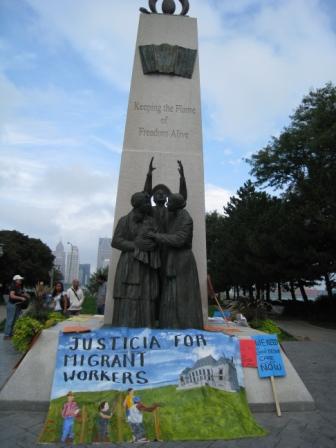
Tower of Freedom Monument to the
Underground Railroad in Windsor
|
On October 2 in Toronto, Justicia for Migrant Workers
concluded its 2011 Pilgrimage to Freedom Caravan across southwestern
Ontario to bring attention to the working conditions migrant workers
face. All along the way, the workers voiced their demands for the right
to permanent residency and citizenship,
an end to repatriations and deportations. They called for labour laws
to be enacted and enforced which enable them to exercise the right to
collective bargaining and equal access to social entitlements. The
coercive role of recruiters and contractors was condemned along with
other forms of state-sanctioned violence
and abuse which cause death, permanent injury and illness for many
migrant workers and, by extension, suffering for their families.
The Caravan deliberately linked the struggle of the
migrant workers today with the historic struggle to end slavery and all
forms of indentured labour. Key stops included historic sites of the
Underground Railroad. The Caravan began on September 4 in St.
Catharines and visited Virgil, Niagara-on-the-Lake and
Niagara Falls. On September 25, the Caravan visited Windsor, Dresden
and Chatham. The final leg of the Caravan visited Simcoe, St.
Catharines, Brantford, Hamilton and Toronto on October 2.

Caravan members at Niagara falls.
|
On September 4, the Caravan began at the British
Methodist Episcopal Church in St. Catharines where workers spoke about
their working and living conditions and also learned about the
struggles of Harriet Tubman, who lived in St. Catharines and made
thirteen missions to rescue more than 70 slaves via the
Underground Railroad. The Caravan then made stops in Virgil,
Niagara-on-the-Lake and Niagara Falls to bring attention to the dismal
living conditions of migrant workers who work in the vineyards of that
region, while noting the disparity of those conditions with the
mansions of the vineyard owners. In
Niagara-on-the-Lake, caravan participants distributed flyers and the
Ontario produce that they plant and harvest. Participants report that
many people were interested to hear what they had to say. Also in
Niagara Falls, the Caravan visited the Nathaniel Dett Memorial Chapel,
an information resource centre for students,
researchers and the community, with historical materials and
genealogical research related to the Underground Railroad.
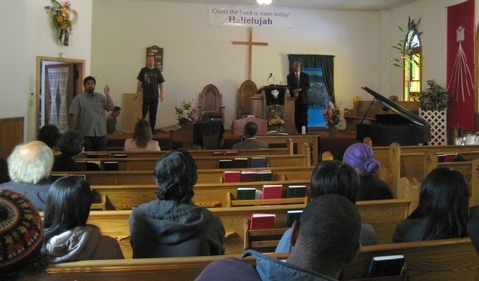
Justicia
for Migrant Workers organizer Chris Ramsaroop addresses the Caravan at
the Sandwich
First Baptist Church in Windsor.
|
The second leg of the Caravan began with at stop at the
historic Sandwich First Baptist Church on Windsor's west side. The site
was a key point in the Underground Railroad for escaped slaves entering
Canada from the U.S. to find support. At the church, participants were
welcomed by Pastor Colin Wisman
Smith who explained the historical significance of the church and its
congregation. He invited participants to explore the rooms under the
floorboards used to hide runaway slaves from bounty hunters, and
expressed solidarity with the struggle of the workers for their rights
today.
Workers and their allies then got back on the bus bound
for the town of Dresden, towards the National Historic Site known as
"Uncle Tom's Cabin." They viewed exhibits that attested to the
existence of slavery in Ontario and, among other things, learned about
the contributions of the Reverend Josiah Henson,
a former slave from Kentucky who became a prominent organizer of the
Underground Railroad Network in southwestern Ontario and later, a
founder of a school and surrounding community for other former slaves.
After touring the grounds, the workers and their allies engaged in
lively discussion about some of
the parallels between the conditions today's migrant workers are forced
to work under and historical conditions of indentured labour that are
supposedly a thing of the past.
One worker told of how in his native Trinidad, the
British used divide and rule tactics to try and pit different sections
of workers against one another, one being the former African slaves and
the other, workers brought in from India as indentured labour. He
explained how today, in Canada, the same practice
also takes place. He explained that at one workplace, Trinidadian
workers were prodded by their employer to work faster because "the
Mexicans are faster than you," while the Mexican workers at the same
place were told the Trinidadians were all outpacing them. Eventually
all the workers discovered what was going
on and together staged a slowdown.
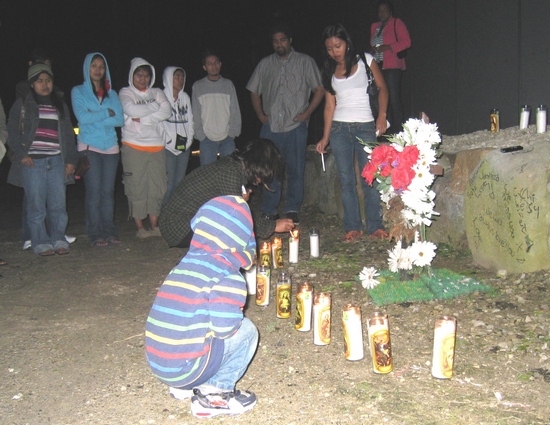 After a visit to the
Heritage Room of the Black
Historical Society of Chatham-Kent, this leg of the Caravan concluded
with a vigil for all the migrant workers killed or injured over the
years in the area. The vigil took place at a memorial near a large
greenhouse operation outside of Kingsville, where some years
ago a migrant worker was killed when struck by a car as he rode his
bicycle home at night. After a visit to the
Heritage Room of the Black
Historical Society of Chatham-Kent, this leg of the Caravan concluded
with a vigil for all the migrant workers killed or injured over the
years in the area. The vigil took place at a memorial near a large
greenhouse operation outside of Kingsville, where some years
ago a migrant worker was killed when struck by a car as he rode his
bicycle home at night.
On October 2, the Caravan culminated with stops in
Simcoe, Brantford, Hamilton and Toronto. During this final leg,
participants visited a number of historic churches, including the Drake
Memorial and Stewart Memorial Churches, whose congregations worked
together to assist slaves who came to Canada from
the United States. Reverends of the churches gave examples of the many
ways the Black community secretly passed information hidden in songs
and quilts to slaves in the U.S. on how to get to Canada. In Toronto
the Caravan began at the Ontario Ministry of Labour and then marched to
the federal Minister of Citizenship,
Immigration and Multiculturalism Jason Kenney's regional office, to
expose the role of both the Ontario and federal governments in
violating migrant workers' rights. Ending the march, workers from
Trinidad organized a spontaneous rhythm section keeping participants
warm as they celebrated their efforts.
Throughout the Caravan, organizers spoke of their
determination to continue the struggle shoulder to shoulder with
migrant workers on the basis that this fight is everyone's fight, and
that an injury to one is an injury to all.
Ontario Political Forum salutes the courageous
stand of the migrant workers in defence of their rights and their
demand to end their exploitation and modern-day slavery. All workers
must stand as one with migrant workers and demand that the government
do its duty to ensure that their rights are
protected in law.
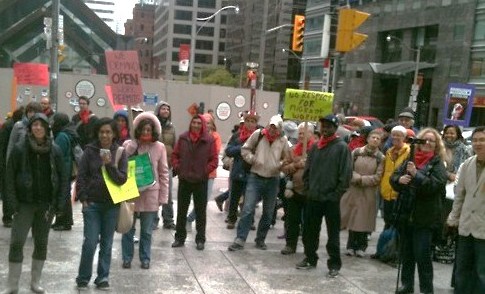 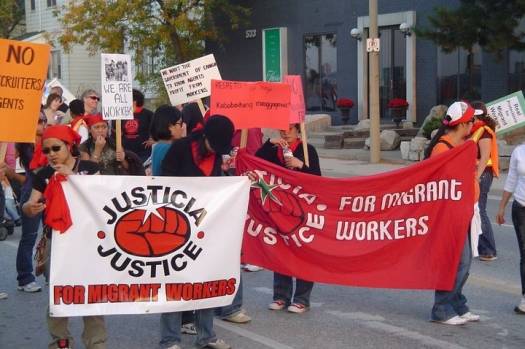 Toronto, October 2, 2011
Toronto, October 2, 2011

Letter to the Editor
Reverse the Unjust Dismissal of
Part-Time College Workers!
- Part-Time College Faculty Member -
 Ontario Political Forum,
No.4
Sept.
29,
on
the
struggle
for
a new direction for college education in Ontario and its analysis
of the recent strike of the 8,000 support staff workers at Ontario's
community colleges, breaks the silence the monopoly media has imposed
on
the voice of Ontario workers who are opposing
the effects of the anti-social offensive on their lives. Ontario Political Forum,
No.4
Sept.
29,
on
the
struggle
for
a new direction for college education in Ontario and its analysis
of the recent strike of the 8,000 support staff workers at Ontario's
community colleges, breaks the silence the monopoly media has imposed
on
the voice of Ontario workers who are opposing
the effects of the anti-social offensive on their lives.
Today there are part-time support staff and faculty at
the community colleges whose demands for union rights are not realized;
their votes for unionization have been locked up in ballot boxes and
held hostage at the Ontario Labour Board for over two years with the
government allowing the College Employer
Council to block these rights. The striking support staff workers took
the demand of union rights for the part-time workers to the bargaining
table during their negotiations.
Days after the strike ended, it has been learned through
word of mouth, some twenty part-time workers at various campuses have
been fired for refusing to cross the picket lines. At the Georgian
College Barrie Campus, there are local news reports of at least four
part-time support staff workers being dismissed
for refusing to cross the picket line. One dismissed worker, who has
worked 24 hours a week with her contract renewed automatically every
year for the past 5 years, decided to back her fellow workers as a
point of moral conscience. She supported the workers' demands for the
colleges to be run by full-time employees
who have full benefits.
At Confederation College, two part-time support staff
workers from Fort Frances and another from Thunder Bay whose contract
was renewed for ten years continuously, were fired for taking
principled stands supporting the strikers.
Arrogantly, a member of the College Employer Council
stated that the workers abandoned their jobs. He said he respects their
right to do what they did but they have to take responsibility for not
respecting their contract. Therefore they are dismissed. We are to
believe this is very reasonable. You break your
contract, you take responsibility for it. But the spirit is not to
solve the problems facing Ontario colleges, merely to criminalize
resistance to the attempts by college administrators to impose
untenable inhuman working conditions which reduce education to issues
of money and an anti-human aim.
It is the College Employer Council which has abandoned
any sense of social responsibility, not the fired workers who risked
their jobs. The Employer Council has abandoned human-centred college
labour relations by forcing part-time workers to renew contracts
semester by semester, year by year and denying
them union rights and wages and benefits equal to their full-time
counterparts.
The College Employer Council is responsible for the
havoc in the colleges this fall semester caused by its refusal to
bargain in good faith.
The criminalization of the dismissed workers seeks to
divert from the fact that the College Employer Council can be held to
account only if the more than 5,000 part-time staff are included in the
back-to-work protocol, which reads:
"...the parties undertake and agree that there will be
no discrimination, intimidation, interference, restraint, coercion,
recrimination, grievances or reprisal action of any kind whatsoever by
either of them or their respective officers, representatives, agents or
members in respect of any person in the employ of the
college, whether covered by the collective agreement or not, because of
such person's participation or non-participation in the strike, or
his/her activity or lack of activity during the strike or his/her
decision to work or not work during the strike and any employee
contravening this paragraph shall be subject to discipline
up to and including dismissal."
Why doesn't this back-to-work protocol apply to the
part-time workers?
College workers -- full-time and part-time, support
staff and faculty, everyone who wants to hold the employer responsible
for working conditions -- must demand that these workers be
re-instated immediately as a condition for going back to work. Do not
allow the College Employer Council to divert from its
own activities by saying, "We respect the right of part-timers to
exercise their conscience but they broke their contacts, they have to
pay for that." Let us not lose this opportunity to put pressure on the
College Employer Council to cease these anti-worker, anti-human attacks
and to honour the return to work protocol
that they have signed.
The union principle, All for One and One for All,
requires new arrangements where laws and contracts uphold a spirit
which solves problems, not a spirit designed to criminalize conscience.
The return to work protocol should ensure that no reprisal actions are
taken against part-time workers.
Oppose the Criminalization of Part-Time
College Workers Who Refused to Cross the Line!
Defend the Rights of
All! All For One and One For All!
Reinstate the Unjustly Fired
Part-time Workers Now!

PREVIOUS
ISSUES | HOME
Read Ontario Political Forum
Website: www.cpcml.ca
Email: ontario@cpcml.ca
|




 After a visit to the
Heritage Room of the Black
Historical Society of Chatham-Kent, this leg of the Caravan concluded
with a vigil for all the migrant workers killed or injured over the
years in the area. The vigil took place at a memorial near a large
greenhouse operation outside of Kingsville, where some years
ago a migrant worker was killed when struck by a car as he rode his
bicycle home at night.
After a visit to the
Heritage Room of the Black
Historical Society of Chatham-Kent, this leg of the Caravan concluded
with a vigil for all the migrant workers killed or injured over the
years in the area. The vigil took place at a memorial near a large
greenhouse operation outside of Kingsville, where some years
ago a migrant worker was killed when struck by a car as he rode his
bicycle home at night.

 Ontario Political Forum,
No.4
Sept.
29,
on
the
struggle
for
a new direction for college education in Ontario and its analysis
of the recent strike of the 8,000 support staff workers at Ontario's
community colleges, breaks the silence the monopoly media has imposed
on
the voice of Ontario workers who are opposing
the effects of the anti-social offensive on their lives.
Ontario Political Forum,
No.4
Sept.
29,
on
the
struggle
for
a new direction for college education in Ontario and its analysis
of the recent strike of the 8,000 support staff workers at Ontario's
community colleges, breaks the silence the monopoly media has imposed
on
the voice of Ontario workers who are opposing
the effects of the anti-social offensive on their lives. As in all aspects of modern
life, individual workers can only be effective in defence of their
rights at work and in the political and economic affairs of the
province if they organize consciously with other individual workers in
a human-centred way. Individual workers are virtually powerless against
the power
of monopoly capital and its capital-centred voice and control of the
political and economic affairs of the province. Individual workers
become effective and powerful in defence of their rights when united
consciously with other workers in every workplace, community,
educational institution, neighbourhood, seniors'
home and most importantly in their own working class political party.
As in all aspects of modern
life, individual workers can only be effective in defence of their
rights at work and in the political and economic affairs of the
province if they organize consciously with other individual workers in
a human-centred way. Individual workers are virtually powerless against
the power
of monopoly capital and its capital-centred voice and control of the
political and economic affairs of the province. Individual workers
become effective and powerful in defence of their rights when united
consciously with other workers in every workplace, community,
educational institution, neighbourhood, seniors'
home and most importantly in their own working class political party.



 The situation is
particularly difficult for the tens of
thousands
of public sector workers who are working in increasing numbers for
agencies in health and education, such as long-term care and early
childhood education, where the wages are low and the benefits poor. To
demand that the wages and benefits
of these workers be frozen is an affront and will only compound the
economic crisis. It is also a convenient diversion from the real
plundering of the public treasury that is being caused by the
pay-the-rich economy in all its forms and by the fact that social
production in Ontario, especially manufacturing, is shrinking.
If workers are blocked from producing the wealth, where are the
resources going to come from to rebuild the public treasury?
The situation is
particularly difficult for the tens of
thousands
of public sector workers who are working in increasing numbers for
agencies in health and education, such as long-term care and early
childhood education, where the wages are low and the benefits poor. To
demand that the wages and benefits
of these workers be frozen is an affront and will only compound the
economic crisis. It is also a convenient diversion from the real
plundering of the public treasury that is being caused by the
pay-the-rich economy in all its forms and by the fact that social
production in Ontario, especially manufacturing, is shrinking.
If workers are blocked from producing the wealth, where are the
resources going to come from to rebuild the public treasury?
 As Drummond so arrogantly
stated in a recent media
interview,
whether Hudak or McGuinty wins the election, the anti-worker scheme
demanded by the rich will be pushed forward by one of them:
As Drummond so arrogantly
stated in a recent media
interview,
whether Hudak or McGuinty wins the election, the anti-worker scheme
demanded by the rich will be pushed forward by one of them:  The Ontario electorate has
been put on notice that no matter who
they vote for, no matter what the outcome of the election, the next
Ontario government is going to have to cut more public services and
provide more "incentives" to attract "investment." The message was
delivered by David Dodge, former governor
of the Bank of Canada, in an interview published by the Globe and
Mail.
It initially appeared on September 6, one day before the election
officially began but has been taken up anew last week, on the eve of
the election, by the Globe and Mail, Windsor Star
and others.
The Ontario electorate has
been put on notice that no matter who
they vote for, no matter what the outcome of the election, the next
Ontario government is going to have to cut more public services and
provide more "incentives" to attract "investment." The message was
delivered by David Dodge, former governor
of the Bank of Canada, in an interview published by the Globe and
Mail.
It initially appeared on September 6, one day before the election
officially began but has been taken up anew last week, on the eve of
the election, by the Globe and Mail, Windsor Star
and others. to growing unemployment, the
debt
and deficit crisis and the gathering storm clouds of another recession.
They see no alternative and have no solutions except more of the same
anti-social, neoliberal offensive, because they are self-serving in the
extreme.
to growing unemployment, the
debt
and deficit crisis and the gathering storm clouds of another recession.
They see no alternative and have no solutions except more of the same
anti-social, neoliberal offensive, because they are self-serving in the
extreme. The workers had thrown a
"retirement party" at Club
Richelieu the previous Sunday which was attended by over 1,000 veterans
of the plant. The proceeds from the raffle draws went to Welland's HOPE
Centre food bank. Said one worker, "All we can do is speak our piece
and hope someone hears." Another asked that "politicians take their
heads out of their butts and do
something about this situation of the loss of manufacturing jobs."
The workers had thrown a
"retirement party" at Club
Richelieu the previous Sunday which was attended by over 1,000 veterans
of the plant. The proceeds from the raffle draws went to Welland's HOPE
Centre food bank. Said one worker, "All we can do is speak our piece
and hope someone hears." Another asked that "politicians take their
heads out of their butts and do
something about this situation of the loss of manufacturing jobs."  More than 280,000 migrant
workers are brought to Canada annually through a partnership between
private sector monopolies and the government of Canada. According to
the April 2011 issue of Focal, a newsletter prepared for the
Canadian International Development Agency: "Canada's temporary
foreign workforce has expanded significantly over the past 10 years. In
2010, 283,096 migrants of all skill levels were granted temporary work
visas in industries across Canada. In the agricultural sector, there
has been steady demand for migrant workers from Latin America and the
Caribbean (LAC), whose numbers
have tripled since 1999. Canada's Seasonal Agricultural Worker Program
(SAWP) was initiated in 1966 through an agreement with Jamaica and has
grown to include Mexico, Trinidad and Tobago, Barbados and the
Organization of the Eastern Caribbean States in response to employer
demand to sustain agricultural
production in Canada. It has grown from 264 workers in 1966 to 23,375
in 2010."
More than 280,000 migrant
workers are brought to Canada annually through a partnership between
private sector monopolies and the government of Canada. According to
the April 2011 issue of Focal, a newsletter prepared for the
Canadian International Development Agency: "Canada's temporary
foreign workforce has expanded significantly over the past 10 years. In
2010, 283,096 migrants of all skill levels were granted temporary work
visas in industries across Canada. In the agricultural sector, there
has been steady demand for migrant workers from Latin America and the
Caribbean (LAC), whose numbers
have tripled since 1999. Canada's Seasonal Agricultural Worker Program
(SAWP) was initiated in 1966 through an agreement with Jamaica and has
grown to include Mexico, Trinidad and Tobago, Barbados and the
Organization of the Eastern Caribbean States in response to employer
demand to sustain agricultural
production in Canada. It has grown from 264 workers in 1966 to 23,375
in 2010."

 and sanctioning trafficking
as a new form of slave labour.
and sanctioning trafficking
as a new form of slave labour.